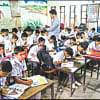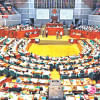Lifting Pry Education Level: A bitter tale of 2 ministries
The much-hyped elevation of primary education up to class-VIII is not going to happen anytime soon.
After months of red tape and shifting blame between the ministries of education, and primary and mass education, the education ministry now says the primary education level will remain up to class-V until further notice.
On Sunday, the ministry sent a letter to the primary and mass education ministry secretary in this regard.
In the letter, the education ministry says it cannot give the go-ahead to the primary ministry's proposal to introduce class-VI at all government primary schools before a new decision is made by the cabinet on this matter.
As part of implementing the National Education Policy-2010, the primary and mass education ministry this August sought approval from the education ministry to introduce class-VI at the primary school.
"It seems the initiative of upgrading primary level education from the existing class-V gets stalled once again," said an official of the primary ministry, seeking not to be named.
DISCORD SURFACES
On May 18 last year, Education Minister Nurul Islam Nahid at a meeting on implementation of the National Education Policy announced the decision of elevating primary education level up to class-VIII from the existing class-V and officially shifted the responsibility for grades six and eight to the primary and mass education ministry.
All the educational activities from classes-I to VIII would now be supervised by the primary and mass education ministry, he said at the meeting attended by Primary and Mass Education Minister Mostafizur Rahman.
Nahid also said all these decisions were made in light of the National Education Policy-2010, which stipulates expanding of free primary education up to class-VIII and secondary education from class-IX to XII.
The next month, Mostafizur Rahman declared that there would be no primary terminal examination for class-V since the primary education was upgraded up to class-VIII.
However, six days later, the cabinet decided that both class-V and class-VIII terminal examinations would continue until further notice.
Things turned into a complete mess when the primary and mass education ministry announced on October 20 that it would not conduct the Junior School Certificate (JSC) and Junior Dakhil Certificate (JDC) exams for class-VIII. Then the education ministry stepped in and held the exams with nearly 20 lakh students.
Soon disagreement emerged between the two ministries over the issue of extending the primary level education. The ministries exchanged letters about the matter, but they were yet to reach any solution.
Currently, there are around 63,000 government primary schools where more than 2.19 crore students are being taught by 3.22 lakh teachers.
On the other hand, 19,000 secondary schools provide education up to class-X. Of these schools, there are 2,381 junior secondary schools providing education from classes VI to VIII. These schools were supposed to go under the jurisdiction of the primary education ministry.
DILLYDALLYING RIGHT FROM THE START
The issue of extending primary education has been facing setbacks since the National Education Policy was approved by parliament in 2010.
The government had formed a sub-committee for upgrading the primary level in January 2011, but the committee failed to submit any report, said sources in the ministry.
However, in 2013, the primary ministry introduced class-VI at around 600 primary schools on a pilot basis, and the plan was to take more primary schools under this initiative and add higher classes in phases.
But a number of problems began to surface soon, and the initiative stumbled due to difficulties in arranging additional classrooms and teachers. Besides, there was a basic difference in the curriculum for the primary grades and for grade six and above, said an official of the primary ministry.
"That's why the ministry could not proceed further," said an official of the primary ministry.
Under these circumstances, it is now unclear what will happen to those 600 schools.
The official said implementation of the decision for upgrading the primary education level would be a big task for the government as it required a huge amount of money for appointing additional teachers, their training and preparation of a new curriculum.

 For all latest news, follow The Daily Star's Google News channel.
For all latest news, follow The Daily Star's Google News channel. 






Comments